It’s easy to dismiss awards. Mainstream awards, especially, can often feel bought, dismissing the best for what the major networks and streaming services decide to push. But, at their best, awards provide an opportunity to celebrate the work that connects with us and our culture. No, they’re never fair. Yes, they’re often influenced by the bigotries that govern our entire world. They still have a place in our arts landscape to get great work to a wider audience.
For the past six years, Autostraddle has sought to fill in the gaps left by the Emmys. If at their worst awards are bigoted and at their best awards are celebrations, why can’t we look beyond the mainstream and celebrate more of the work ourselves? Well, that’s exactly what we’ve done. The Emmys might acknowledge a fraction of the great queer TV that gets made — we acknowledge that and all the rest.
This is even more important now that our shows are frequently getting canceled and fewer are getting made. Even if these artists deserved more time to tell their stories, we can celebrate the television that was created against all odds.
And with that, here are the winners of the 6th annual Autostraddle TV Awards.
Outstanding Drama Series
A League of Their Own (Prime Video)
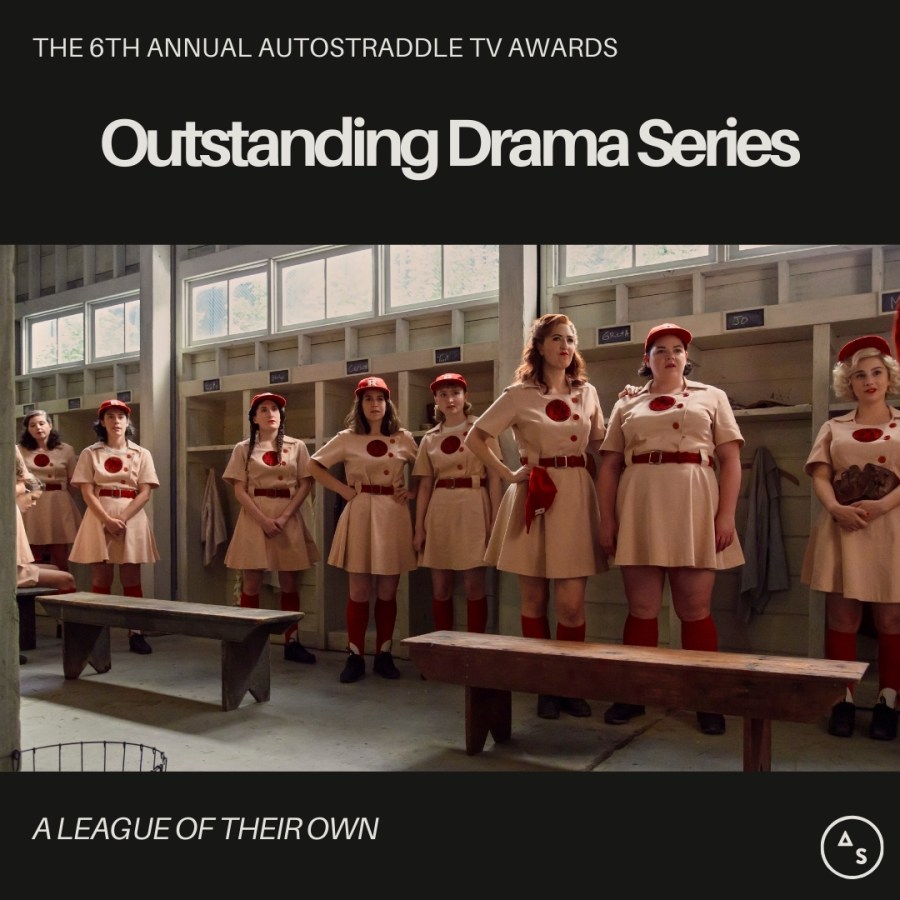
I’ve been waiting a long time to write this tribute.
First, A League of Their Own’s 2022 late summer release meant that it didn’t qualify for that year’s TV Awards. Then the fall 2023 TV Awards landed in the middle of an incredibly necessary, and historic, labor strike in Hollywood. Which means that here we are, in the early weeks of 2024 before I could finally, officially, give A League of Their Own their well-earned and proper due.
It’s almost ironic then that 18 months later, I am still at a loss how to even put A League of Their Own into words. That time we all spent together, that first crack of a bat hitting a ball, the first whiff of fresh cut grass off the dugout? It felt like magic. That confident quirk of a smile when Greta flicked her eyes at Carson? Magic. The soft, steady hands of Uncle Bert on Max’s shoulder before their kitchen haircut? Magic. Jo stepping up the to plate like Babe Ruth? Bev pulling Jess aside to promise, “we have to take care of our own”? Lupe’s… well, everything? Magic magic magic.
Watching Will Graham and Abbi Jacobson’s sublimely queer remounting of A League of Their Own was a television moment unlike any other. And thanks to Prime Video’s decision to unceremoniously cancel the beloved series, we won’t be able to experience it again. But even if the powers at be only let them do it once, I’m so grateful they stole this base. — Carmen
Outstanding Comedy Series
Sort Of (Max)
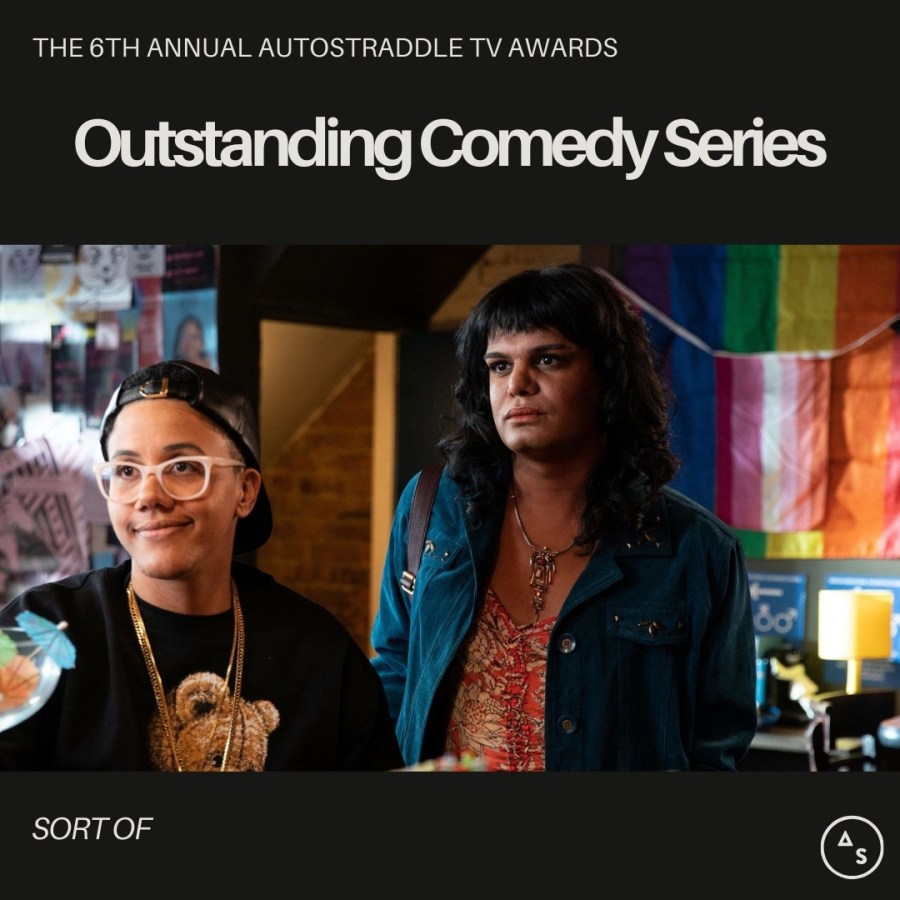
“It’s what I want, with everybody, not just my romantic relationships but like family and friends, with all the loves I have. Just, I want that uncomplicated Rachel McAdams love. That’s doable, right?” Sabi wonders early in Sort Of‘s second season. But every time that “uncomplicated Rachel McAdams love” feels like it’s within Sabi’s grasp, the ground beneath them shifts and the hope of achieving it slips further aways. Sabi finds comfort and understanding in the arms of Olympia and then, the ground shifts, and they’re introduced to Olympia’s husband. They find a refuge in Bar Buk but then the ground shifts, it closes, and Sabi and their friends are forced to imagine something new. Sabi starts to build an understanding with her mother but then the ground shifts and their abusive father returns. And then, just as Sabi’s building some semblance of a connection with their father, he dies. The ground is always shifting beneath our feet.
Sort Of succeeds in making a very specific story feel relatable and universal. If season one of Sort Of is about discovery, then season two is about confronting a new reality, tethered to the truth and not to expectations or assumptions. Sabi, of course, takes center stage — chasing that “uncomplicated Rachel McAdams love” with a full sense of who they are and what compromises they will and won’t make — but the challenge extends to the entire cast. Paul reunites with his wife — Bessy, who spent most of the first season comatose — and has to nurse her back to health, with a full understanding of their estrangement. Violet grapples with her mother’s return and how to reconcile that with the person she’s grown into in her mother’s absence. Even Sabi’s mother, Raffo, long constrained by beliefs foisted upon her, gets to revel in her newly found independence. Sort Of remains the story about how all of us — cis, trans, queer, straight, young, old — are always evolving in our own way. — Natalie
Outstanding Sci-Fi/Fantasy Series
The Last of Us (HBO)
When I think about The Last of Us, I am often thinking about how much I love it and how much my friends love it. I can sometimes forget how important it is that this sweeping, post-apocalyptic, high-budget, well-advertised, hugely popular, mainstream show stars a non-binary actor who plays a queer teenage girl. And yes, everyone always talk about the Bill and Fred episode, but the “Left Behind” episode was such a beautiful display of first love, and first heartbreak. With both episodes, queer love was centered and celebrated, even in such a dark world. At the end of the day, that’s what the show is about: the humanity and love that can be found, even at the end of the world. We’ve seen so much de-gaying of source material for decades — even as recently as 2020 — so it’s refreshing to see an adaptation lean so confidently into the beautiful queerness of its story. — Valerie
Outstanding Animated Series
Harley Quinn (Max)
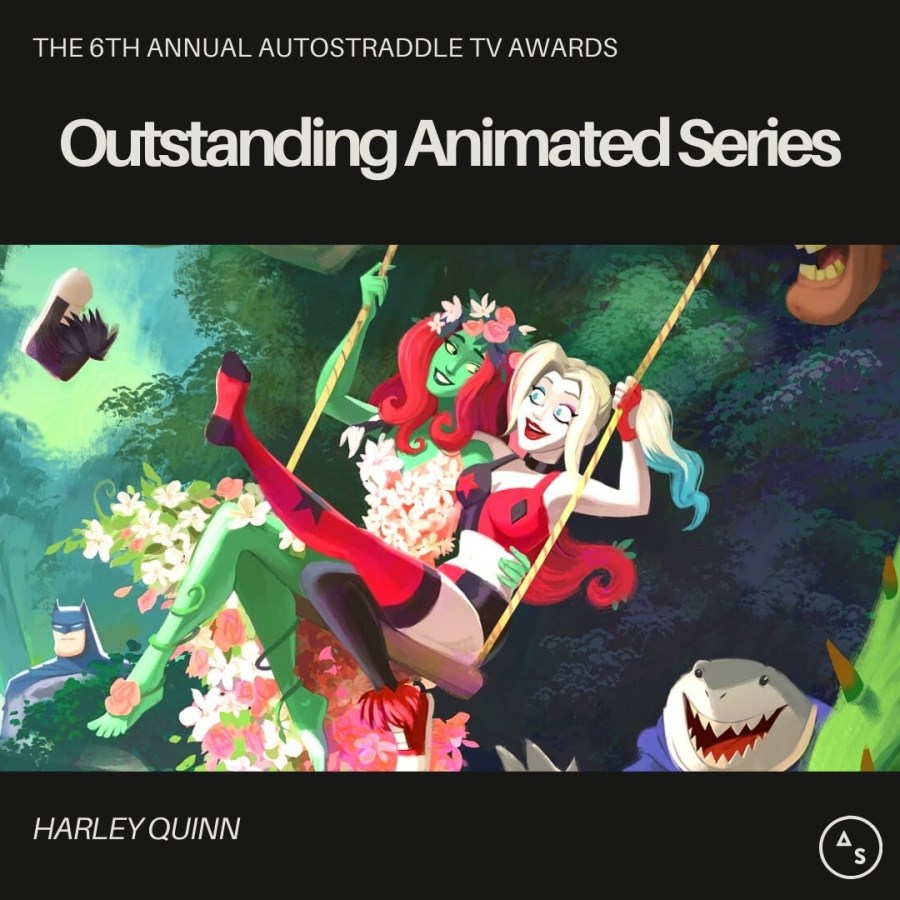
Harley Quinn is a great example of why adult animation is so fun and important. Not being directly attached to the DCU, and not having to worry about special effects like a live-action show, this series is able to pull from the most obscure and wacky pages of DC comics. They can really run with it without having to worry as much about the big studio execs demanding ‘universal appeal’ or whatever crap makes it so that in the live-action DCU movies, Harley Quinn’s bisexuality is just briefly a hint. In this show, she is queer and proud and in love with Ivy and their relationship is the emotional arc of the entire show. This season they are solidly in love and trying to find a work/life balance, centering their relationship while trying to girlboss their various organizations. It’s fun, it’s wacky, it’s so, so gay. — Valerie
Outstanding Lead Actor Playing an LGBTQ+ Character in a Drama Series
Jasmin Savoy-Brown, Yellowjackets
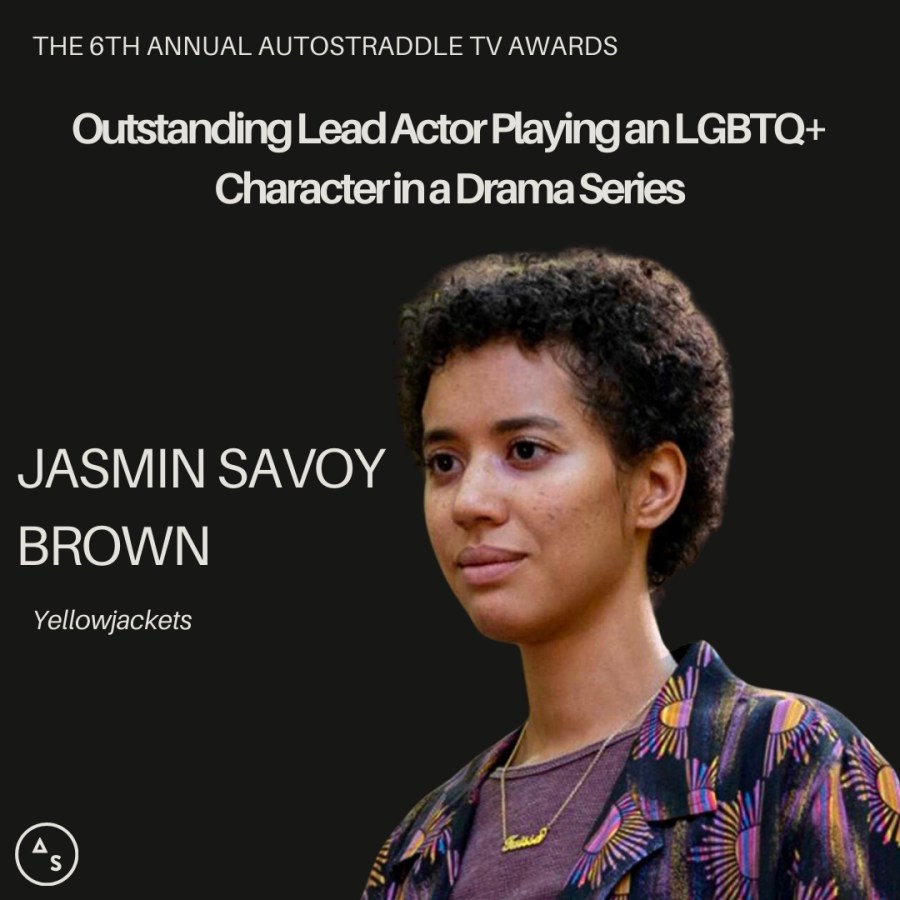
Jasmin Savoy Brown really brought the fear factor to season two of Yellowjackets, portraying teen Taissa’s further descent into sleepwalking chaos and instability with chilling details. Tai was really put through the ringer this season, and she also embraced cannibalism with gusto (but apparently has no memory of it), and Brown really sells it all while also bringing dynamics to what could easily be one-note drama. The best horror performances are unsettling and alluring in equal measure, and Brown definitely delivers. — Kayla
Outstanding Supporting or Guest Actor Playing an LGBTQ+ Character in a Drama Series
Lea Robinson, A League of Their Own
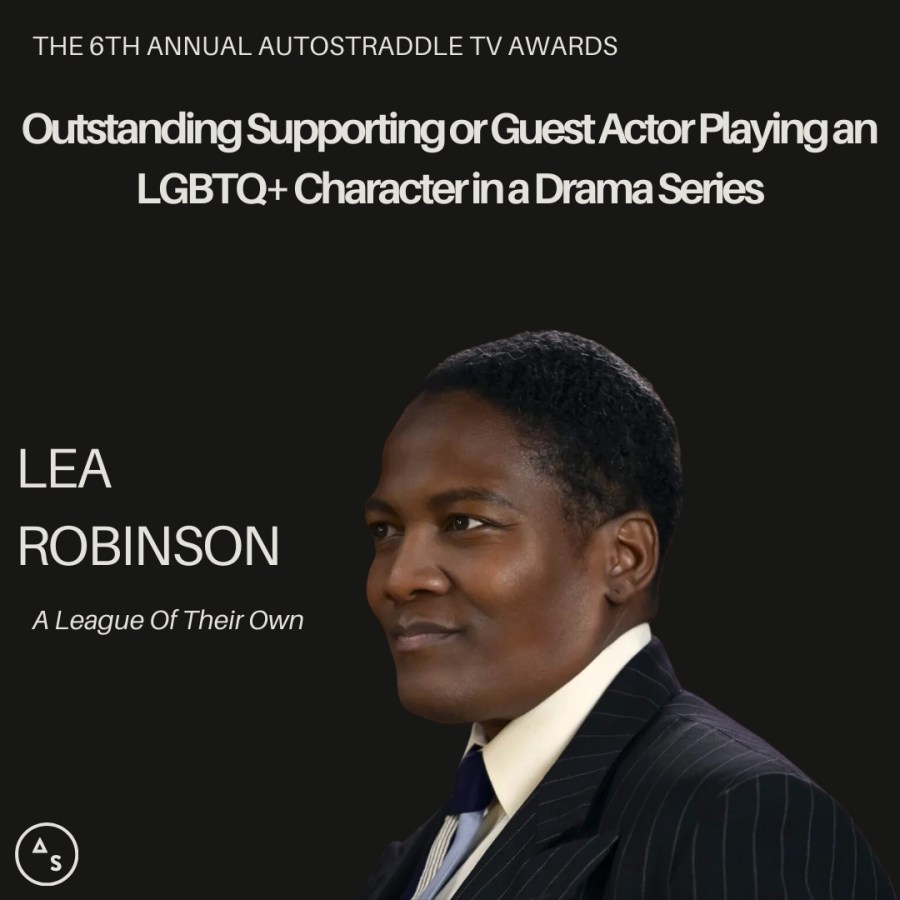
For me, it was always Uncle Bert. There is a world where A League of Their Own made a different choice. Where they settled for Greta and Carson’s storyline alone and considered it to be “enough.” People of color, trans people, we hear that a lot: Next time. Your turn will be next. Especially for a series set in the 1940s, it would have been so easy to hide behind the lies of what too many people assume to be “historically accurate,” instead of push for the honesty of what’s more.
But this is not about representation for representation’s sake. In Lea Robinson’s hands Uncle Bertie felt real, warm, loving. The specter of Bertie haunts the first few episodes of A League of Their Own, brought to life only in the hushed whispers of Max’s parents, worried that their daughter might turn out “that way.” When Max leaves her parents house, Bertie’s is the first place she runs.
It’s in Bert that Max finds queer family. And they are already blood relation, yes — but blood isn’t what makes our family our own. It’s Bertie who cuts Max’s hair in the kitchen, who takes her out bowling, who encourages her to flirt with girls, and who sews Max her first suit. When Max shuns Bert in public — it’s Bert who pushes back. This is not, and was not, Max’s story alone. Bert is just as deserving of a family who sees them on their own terms.
In fact, Bertie’s final scene doesn’t include Max at all. Bert confronts their sister, at last allowed to release a specter of their own. You see for some people “playing it safe” suffocates rather than frees. And by living their life out loud, Bertie gets to live in abundance. — Carmen
Outstanding Lead Actor Playing an LGBTQ+ Character in a Comedy Series
Bilal Baig, Sort Of
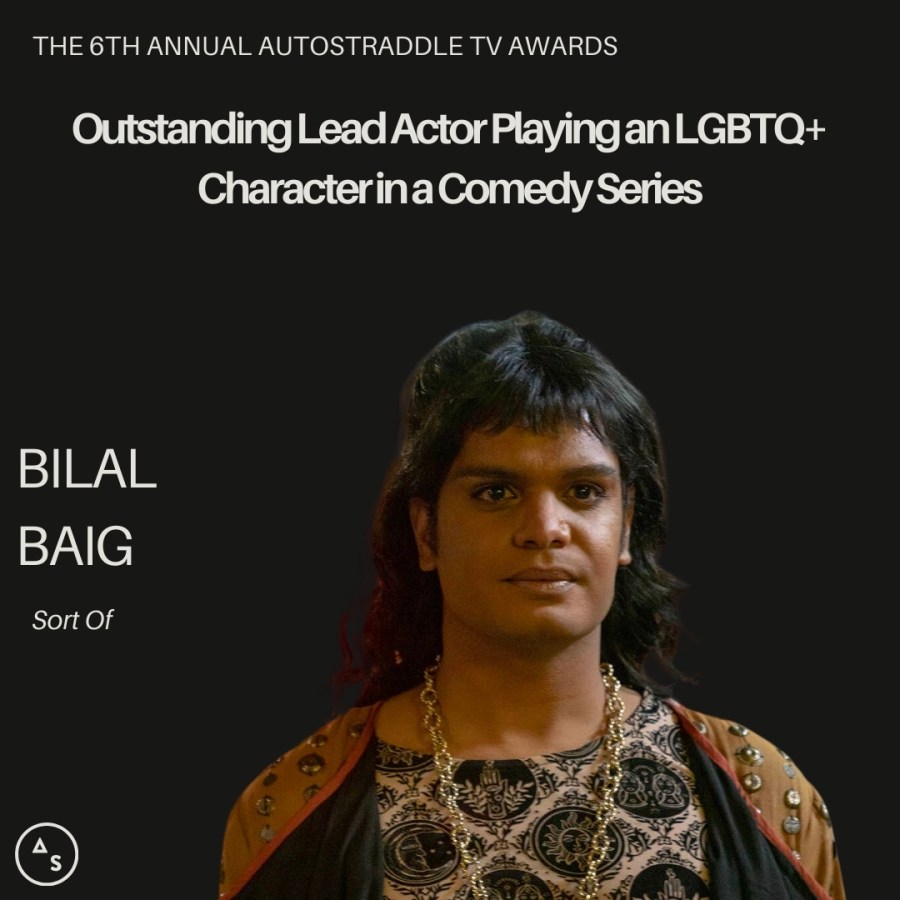
Because they are also the co-writer and co-creator, Bilal Baig has received more praise as a storyteller than as an actor. This praise is deserved — season two built on the promise of season one and became one of the best shows on TV — but their achievement in their show as an actor should not go unmentioned.
Sabi responds to the world with a defense mechanism of remove. They’re deadpan in their humor, detached in their emotion. Baig showed the cracks in this exterior in the first season and in season two reveals even more as Sabi challenges themself to be more open. Whether in their fraught relationship with their dad or their desires in two very different romances, Sabi is trying to let their walls down while still not getting hurt. Baig plays all of this perfectly, a grounded performance that will have you laughing one moment and crying the next. It’s subtle work and subtle work this accomplished deserves all the recognition. — Drew
Outstanding Supporting or Guest Actor Playing an LGBTQ+ Character in a Drama Series
Amanda Cordner, Sort Of
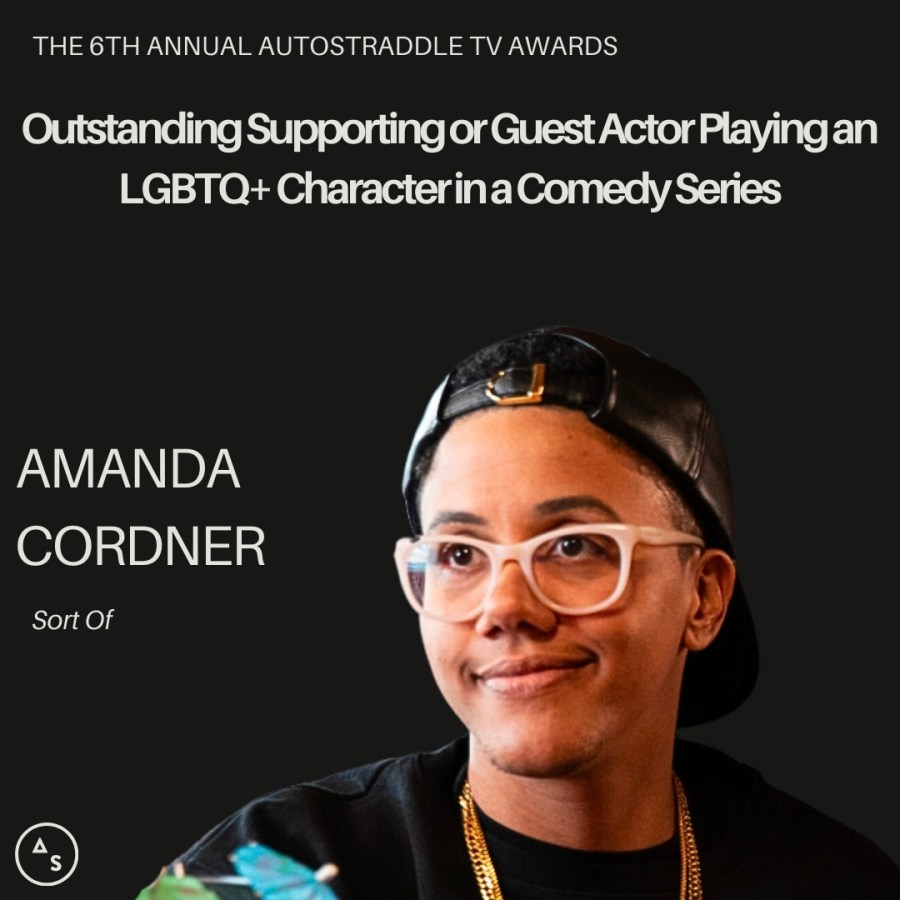
The “funny friend” is a trope for a reason. While the protagonist is experiencing the dramas of life, the funny friend is there for comic relief. They provide support for the protagonist and provide jokes for the audience. But lighter doesn’t mean easier. For this role to succeed, an actor needs to create a real person even with less time and focus for development.
Since season one, Amanda Cordner has been an absolute joy as 7even. She has quickness and an energy that provides a perfect foil to Bilal Baig’s more deadpan Sabi. But in season two, 7even’s character was deepened as we spent more time with her mom. While still providing comic relief, Cordner was allowed to dig into the complexities behind 7even’s outward persona. It’s the kind of thing that’s possible in a second season, but also the kind of thing only possible when a performer already established a clear and full character. — Drew
Outstanding Lead Actor Playing an LGBTQ+ Character in a Sci-Fi/Fantasy Series
Bella Ramsey, The Last of Us
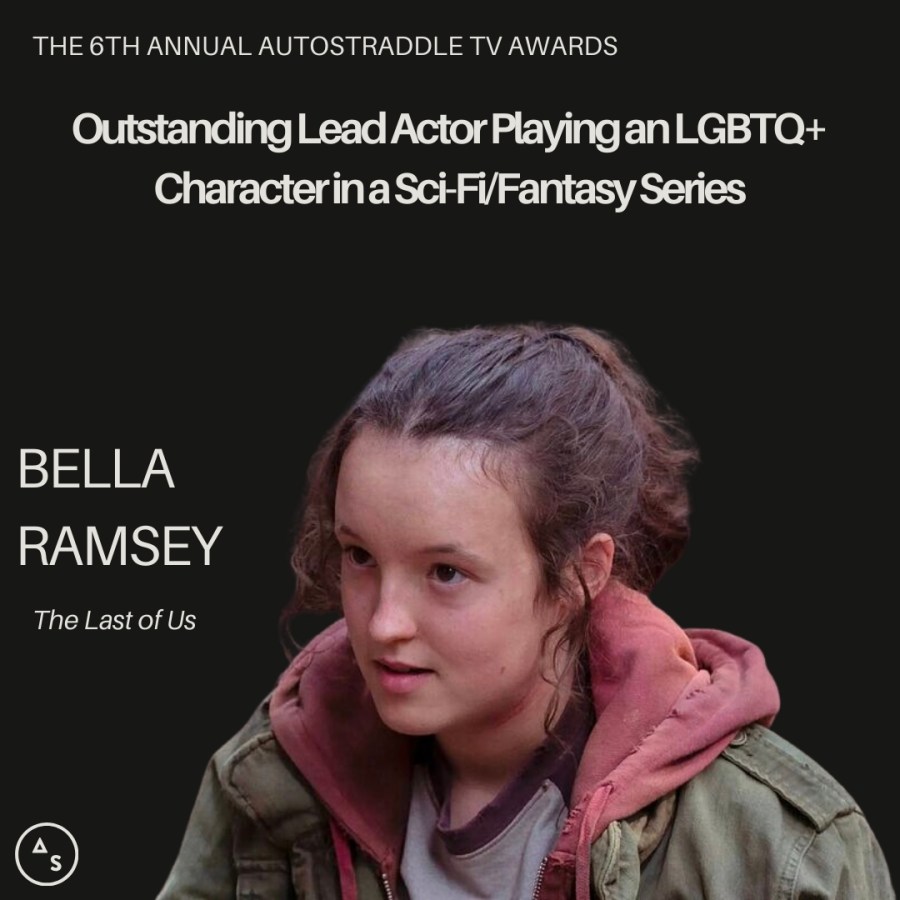
It’s not easy to carry a show like this on your shoulders, but Bella Ramsey did just that. While there is definitely an amazing ensemble cast in the show, when it comes down to it, the story is about Ellie and Joel. Ramsey had the challenge of making Ellie sarcastic and funny in a way that covers a layer of fear and trauma, in a way that evolves as the show goes on, and they excelled at it. At any given moment, their face is portraying fear, hurt, bravery, hope. And, in addition to being such a talented performer, it’s really special to have the lead of such a huge show openly talk about being non-binary, and being queer (or, as they sometimes put it, “not straight, a little bit wavy.”) — Valerie
Outstanding Supporting or Guest Actor Playing an LGBTQ+ Character in a Drama Series
Storm Reid, The Last of Us
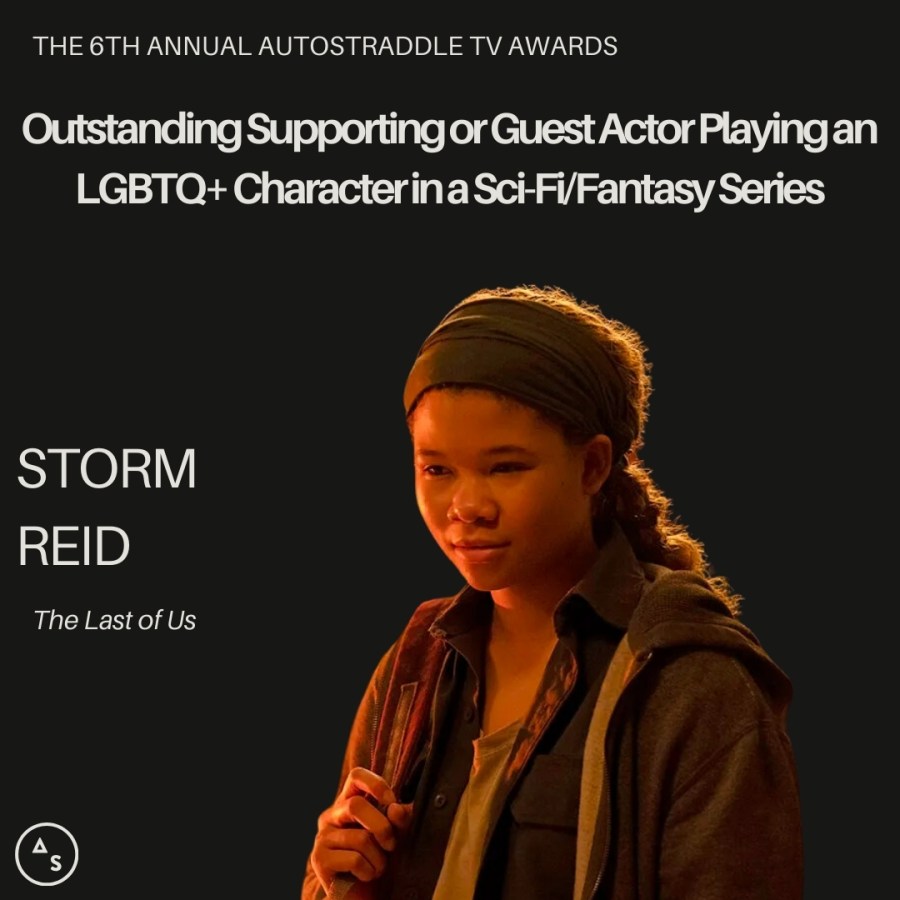
I remember being nervous for the episode, “Left Behind” when the TV adaptation for The Last of Us was announced. Whoever played Riley would need to get us to fall in love with the character over the course of one episode, so that when her fate was revealed, the importance of that relationship to Ellie and how it affects her would be felt. Well, Storm Reid gave all of that and more.
Riley and Ellie’s relationship has long been a fan favorite in part because of the queer undertones between them in the game. Storm managed to give Riley confidence and vulnerability with a dash of playfulness that made it easy to see why Ellie had a crush on her best friend. One of my favorite scenes from the game is when Riley and Ellie take pictures in an old photo booth, and somehow Bella and Storm punched up what was already an adorable scene. For me, the heart of Storm’s performance comes near the end of the episode, after Riley and Ellie have their fun, after they kiss, after they get bit. They’re sitting together deciding what to do now that they’re infected, and Riley says “Whether it’s two minutes or two days, we don’t give that up. I don’t want to give that up,” and she holds her best friend and cries while repeating “I’m sorry” over and over again. As far as she knows, this is the end for the two of them and all she wants to do is hold her best friend.
Not only did Storm give this performance exactly what it needed to give, but she also understands just how special this story is and what it means especially to queer Black women. After her recent Emmy win, she said, “…I think my role in The Last of Us really reinforced my love and passion to be able to tell meaningful stories and to be a representation for young women, young Black women, young, queer Black women.” — Nic
Outstanding Performance by a Straight Actress in a Straight Role
Melanie Lynskey, Yellowjackets
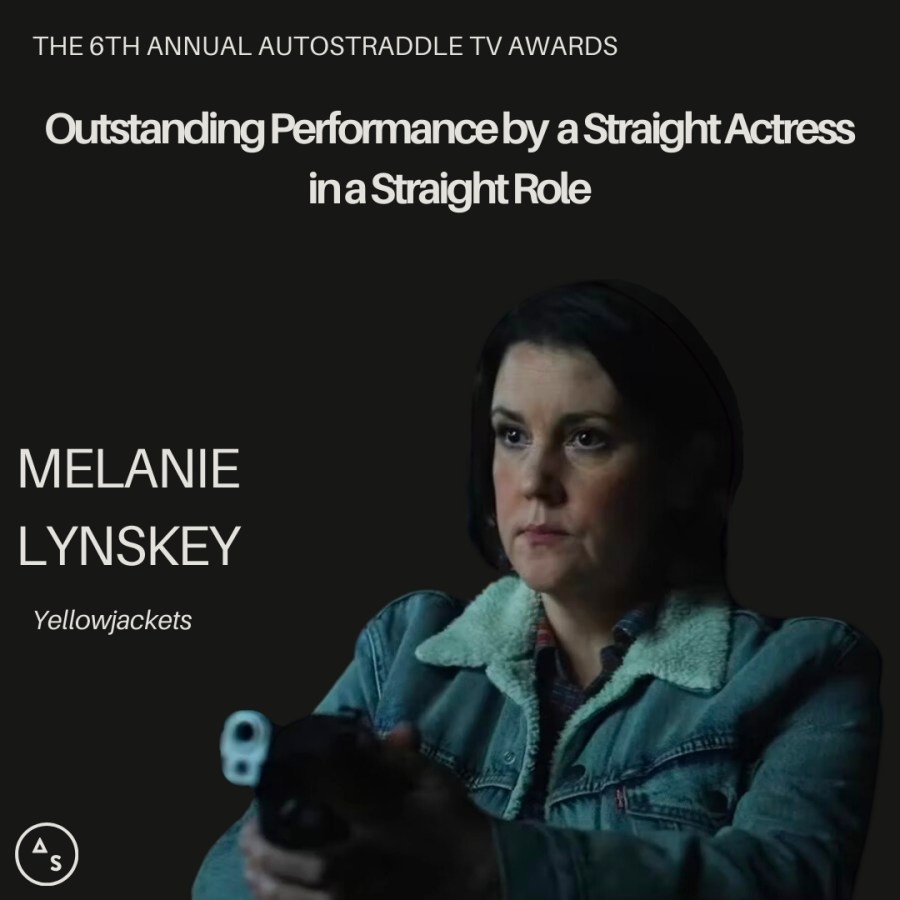
Three months ago, when we were in very early stages of planning this year’s Autostraddle TV Awards, regarding the groundbreaking category of Outstanding Performance by a Straight Actress in a Straight Role, I wrote: My campaign for Melanie Lynskey starts now. Well friends, we did it. Celebrating her brilliant work as Shauna in season two of Yellowjackets, we’re here today because we’re gay — even if she is not.
In all seriousness, Lynskey really is a standout of a very stacked array of performances in this recent season of Yellowjackets. (Her monologue with a gun one of the best moments the series has delivered so far.) I think regardless of how she does or does not identify, we can all agree that Melanie Lynskey is for the gays. — Kayla
Outstanding Cis Male Character
Pedro Pascal as Joel, The Last of Us
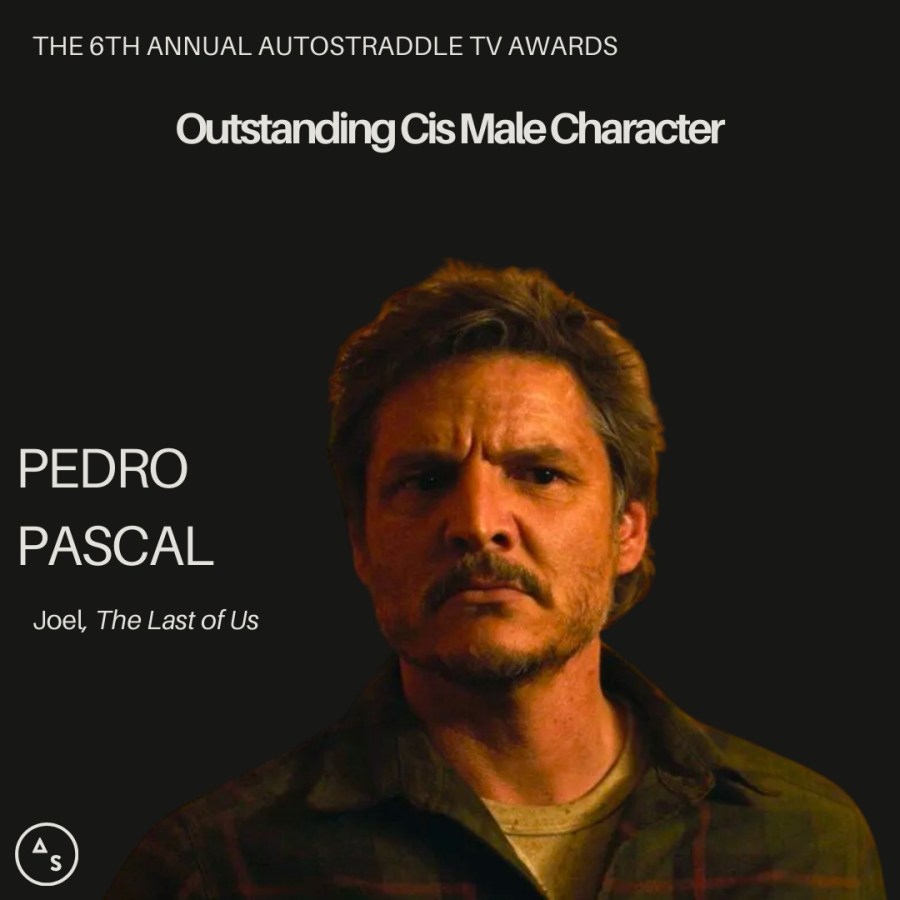
No matter how amazing Bella Ramsey was at portraying Ellie, The Last of Us wouldn’t have worked if the Ellie and Joel relationship hadn’t worked. The thing about Ellie and Joel is that it has to be a bit of a slow process; they don’t trust each other at first, and they have to warm up to one another. The chemistry of that can be hard, because Joel can’t be so cruel to Ellie in the beginning that you never forgive him, and the energy must always be paternal. It’s not an easy feat, and yet Bella Ramsey and Pedro Pascal make it look easy. Pedro himself has been a fierce ally, constantly praising Bella in interviews with their correct pronouns. Considering his sister, who is trans, has spoken about how immensely supportive Pedro has always been of her, this isn’t a surprise. But it’s still refreshing to see from a cis man who has amassed such a huge fandom from shows like Game of Thrones, The Mandalorian, and Narcos. — Valerie
Santana Lopez Legacy Award For Outstanding Queer Teen Character
Ari Notartomaso as Cynthia, Grease: Rise of the Pink Ladies
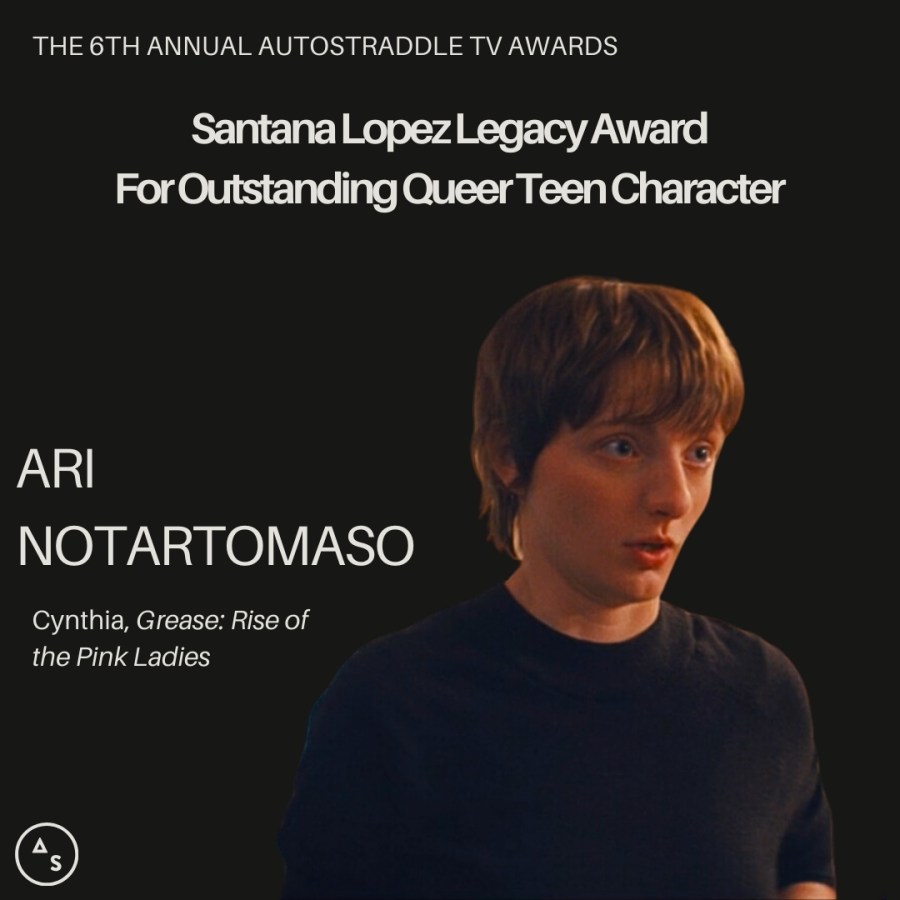
When I think about the Santana Lopez Legacy award, I think about characters who affect us queer adults, and, more importantly, characters who can impact actual teens seeing themselves represented for the first time. As a kid, I always struggled to fit in with the girls, because I was considered a “tomboy” and wasn’t into a lot of the things girls were “supposed” to be into. I also didn’t fit in with the boys (nor did I, personally, have any interest in it.) But something I’ve learned as I got older is that gender isn’t as black and white (or blue and pink) as we were raised to believe.
It would have been easy for a show like Grease: Rise of the Pink Ladies to do hand wavy “it was the 50s” and not address some of the topics they explore on the show. Surely people in the 50’s were dealing with these things, but media rarely shows it. Not Pink Ladies. Instead they gave us Cynthia, portrayed by the immensely talented nonbinary actor Ari Notartomaso. Cynthia is a teen girl who wants to be one of the boys but who isn’t treated well or accepted by them. And instead of changing herself to fit in with the boys OR the girls, she finds a group of friends who accept her as she is, gender nonconformity, queerness, and all. I don’t know if the series went on if Cynthia would have ended up feeling more trans, but as she stands, she’s a queer girl who presents in “masculine” ways, and I think it’s so important to see teens accepting a butch girl as one of their own. Teens need to see that words like “girl” don’t always have a hard and fast definition. Anyone can be a Pink Lady. Even Cynthia. — Valerie
Best Episode with LGBTQ+ Themes
A League of Their Own, ep. 106: “Stealing Home”
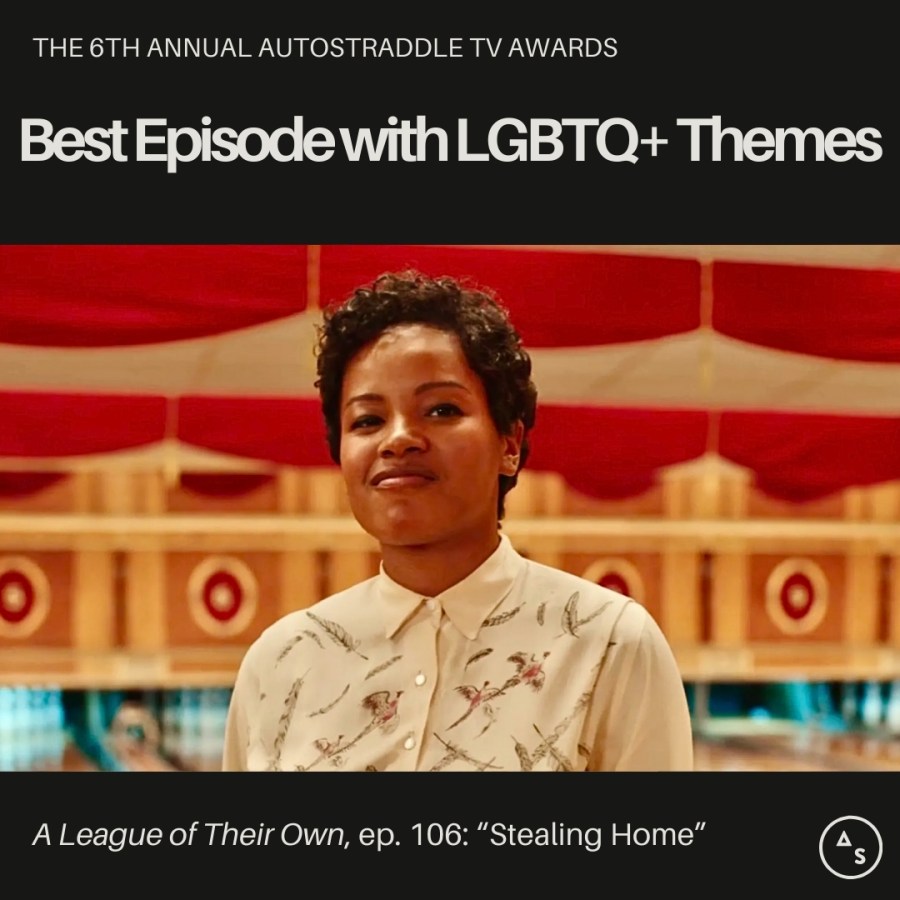
One of my least favorite arguments is that period pieces about people who aren’t white and straight will always be about trauma. It’s used as an explanation from some for their dislike and for others to ask period pieces to disengage from the reality of when they’re set. But this argument itself is ahistorical. It’s disrespectful to our ancestors who not only fought but played, who not only suffered but celebrated, who not only died but lived.
As an entire show, A League of Their Own finds an inspired balance between history and joy. Period pieces and reboots have struggled immensely in recent years in their aspiration for inclusivity — this show does it with grace. And episode six of the show’s single season is its ultimate achievement. I’m in awe of how much queer history is told in this one episode and how well-balanced it is between joy and pain. Contrasting the Peaches’ time at the underground lesbian bar with Max’s time at her uncle’s party is inspired. Even when the former faces the harsh reality of a police raid, the latter is allowed to be a story of happiness and discovery.
I’m not as attached as some audiences to queer stories that lean toward joy. But I do care about clear perspective and tone and this episode is a masterclass in both. Anyone wanting to tell stories about queer history should study this show and this episode. We don’t have to choose between fun and reality. The reality is queer people have always found fun, have always found community, have always found ourselves. — Drew
Outstanding Performance by an Out LGBTQ+ Actor in a Drama
Devery Jacobs, Reservation Dogs
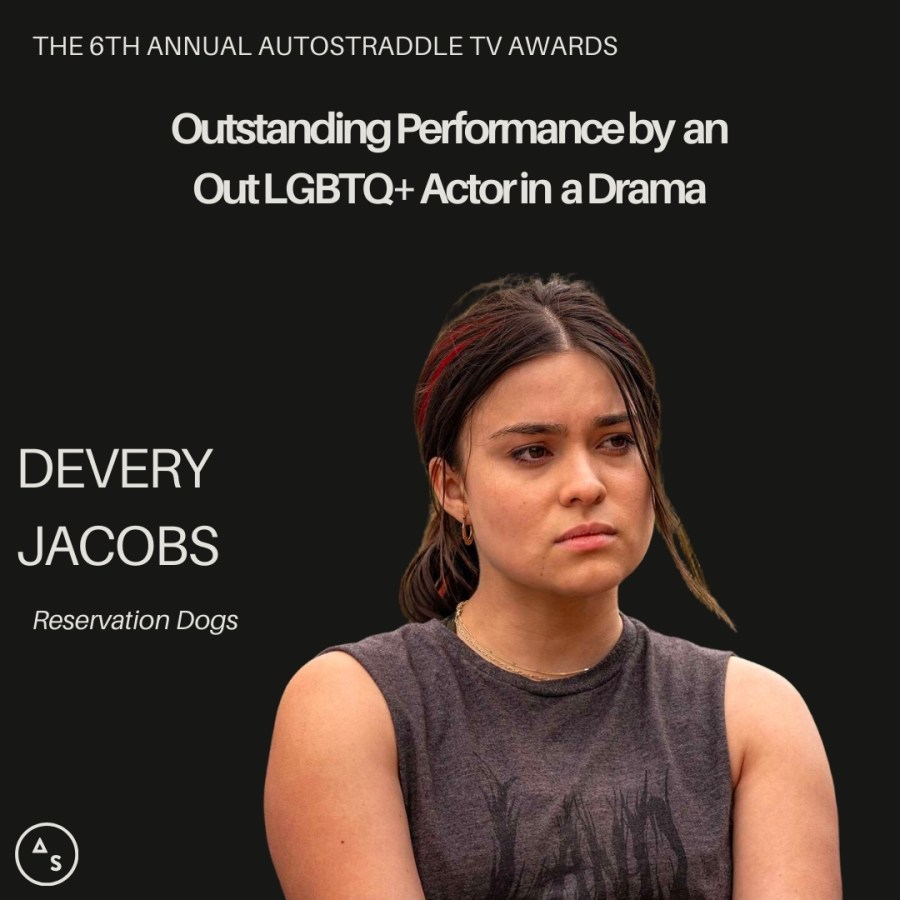
Early in Reservation Dogs‘ run, Elora and her crew — Bear, Cheese, and Willie Jack — are gathered at their hideout when Bear laments all the crimes they’ve committed and all the people they’ve (however unintentionally) hurt. Elora refuses to feel even a second of regret: They stole that money “fair and fuckin’ square,” she notes. He insists they give the money back but Elora is unmoved.
“This place is shit. Fuck this town, Bear, you don’t owe anyone anything. Fuck the village, fuck the people in it,” she spits. It was this place — this town — that killed their friend, Daniel, and she won’t allow this place to do the same thing to her. She’s getting out, with or without them.
But the first time Elora gets out — when she absconds to California with Jackie — she returns, remembering that she owes at least one person something: her grandmother, the woman that raised her after her mother’s death. Mabel’s sick and Elora returns to watch her community usher her grandmother into the next realm. Elora’s no stranger to loss but this is different. She witnesses a death that feels like its part of the natural order of things…there’s food, there’s community, there’s prayer, there’s singing, there are even jokes. Death doesn’t have to be traumatic, Elora realizes; she’s finally able to let go of the grief she’s been holding.
The beauty of that realization doesn’t happen without Devery Jacobs, who shoulders Elora’s emotional load. It feels like too much for the character but also it feels like too much for an actor…to embody all that hurt, to carry all that pain. Jacobs does it with aplomb. She carries the weight of Elora’s grief and sadness — in her words, her eyes, and her posture — and releases it all when she greets her grandmother as a spirit (“Crazy, ennit?”). In a just world, Jacobs would be among the nominees — for her acting and her writing — at the major awards but no one need tell the Rez Dogs that this world is unjust. — Natalie
Outstanding Performance by an Out LGBTQ+ Actor in a Comedy
Ayo Edebiri, The Bear
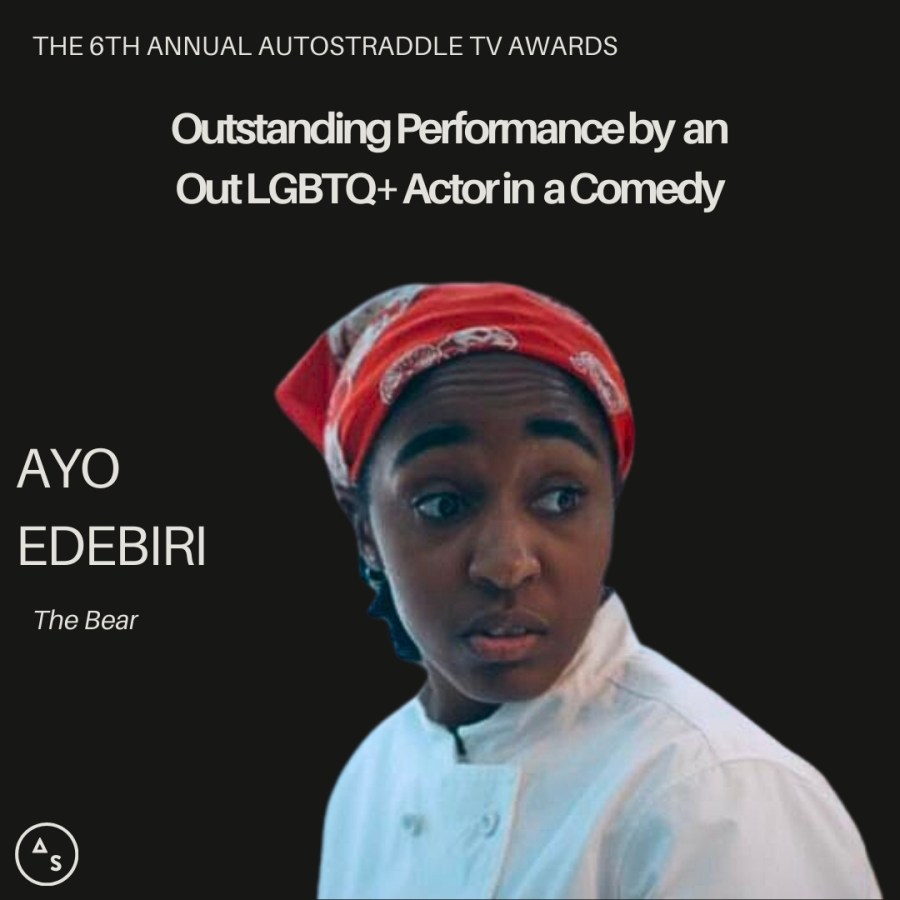
Ayo Edebiri’s Sydney Adamu arrives at The Beef with a pedigree that feels inconsistent to the position she’s being offered. She attended the Culinary Institute of America and she’s worked at Chicago hotspots Alinea, Avec, and Smoque. So what, her prospective boss, Carmy, wonders, is she doing here? Or, as he puts it succinctly later, “your resume is excellent and this place is not.” Sydney makes excuses but, ultimately, she’s here to learn and rebuild her confidence. Except instead of easing into a space where Sydney can rebuild her confidence, she’s tossed into a pressure cooker with a staff the resents her presence and a boss who insists on system that won’t work.
“So, like, because I’m the sous, right? Like, I just, uh, follow orders, even if it leads to tension and, uh, chaos and resentment and ultimately doesn’t work,” she tentatively explains after Carmy announces the new system.
Sydney is asked to do too much and Edebiri delivers each and every time. You see the quick wit and dexterity on full display — honed by Edebiri’s years on small comedy stages — when she exchanges quips with Richie. Edibiri volleys from eagerness to impatience to arrogance, sometimes within the space of one episode, and it is a marvel to watch. In less skillful hands, Sydney would feel like too much — too strident for the family atmosphere, too green for her Michelin-star ambitions — but Edebiri imbues her with so much light that it becomes impossible not to cheer for the young sous. — Natalie
Outstanding Performance by an Out LGBTQ+ Actor in a Sci-Fi/Fantasy Show
Bella Ramsey, The Last of Us
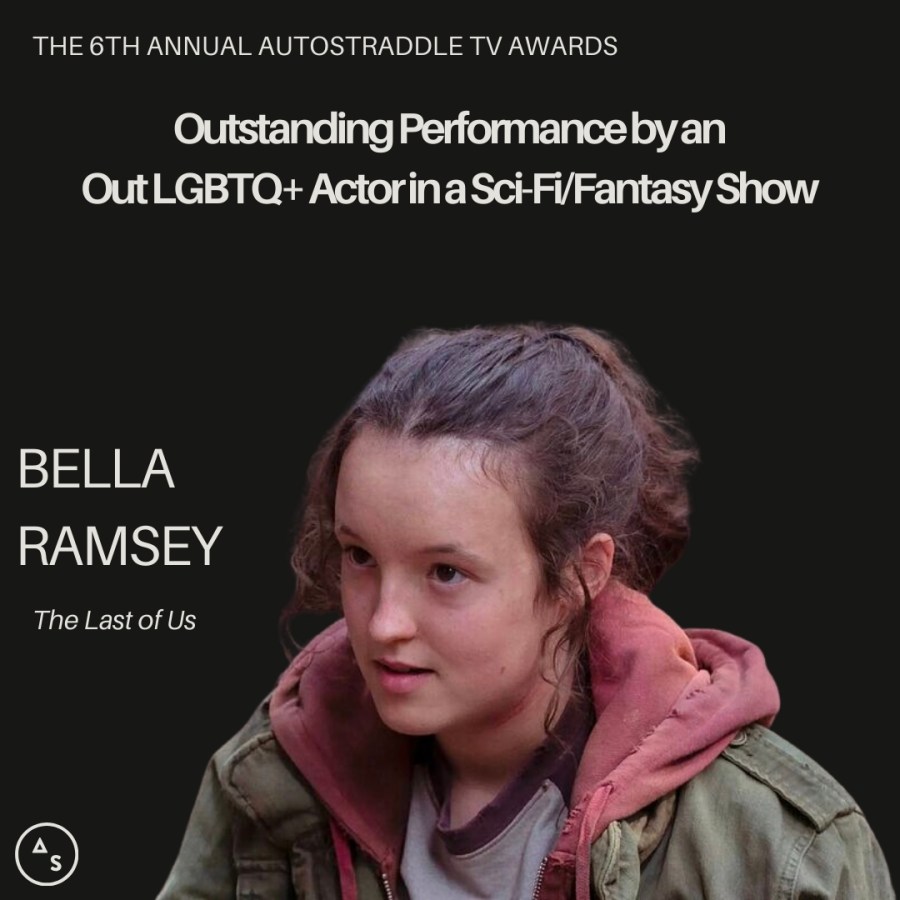
What can I say about Bella Ramsey that I haven’t already said on this very website? Welp, challenge: accepted. This tiny dynamo burst onto the scene as Lyanna Mormont on Game of Thrones, and even then it was clear that they were something special. When they were cast in the role of Ellie in The Last of Us, I was cautiously excited. I knew Bella was good, but were they “embody the murder daughter I would protect with my life” good? The joke was on me because they somehow exceeded my expectations!
Ellie Williams might only be 14 years old, but in her short life she’s experienced more than most of us ever will. She was born into a global pandemic (okay I guess we can relate on one thing) caused by a cordyceps virus that turned anyone infected into a walking fungal nightmare. Her mother died after giving birth to her, she was raised in a government-run school, she watched her best friend turn into one of the aforementioned fungal nightmares, and because of that last thing, she learned that she was immune to the virus, having survived the same attack that claimed Riley. It makes sense that she’d have a bit of a chip on her shoulder.
Bella gave Ellie that “take no shit” attitude that we expected, and added in a dose of vulnerability always reminding us that despite all she’s been through, Ellie is still just a kid. A kid who’s been forced to grow up quickly in a violent and unforgiving world, but a kid all the same. So much of TV Ellie’s impact is in what she doesn’t say; it’s the uncertainty in her face after she kisses Riley and the relief when her friend kisses her back; it’s the flicker of understanding in her eyes when Tess gets infected. Bella breathed new life into a character I thought I knew because of Ashley Johnson’s video game portrayal. One of the most heartbreaking lines in the game is when Joel accuses Ellie of not understanding loss and she says “Everyone I have cared for has either died or left me… so don’t tell me I would be safer with someone else, because the truth is I would just be more scared.” It makes me cry every time I play, and when Bella said the same words in the show, they hit differently but just as hard. That’s the beauty of their performance; they made Ellie their own, while maintaining the spirit of a character so many people know and love. Congrats Bella, I can’t wait to see how you manage to emotionally devastate me in season two. — Nic
Outstanding LGBTQ+ Director/Writer/Showrunner
Abbi Jacobson and Will Graham, A League of Their Own
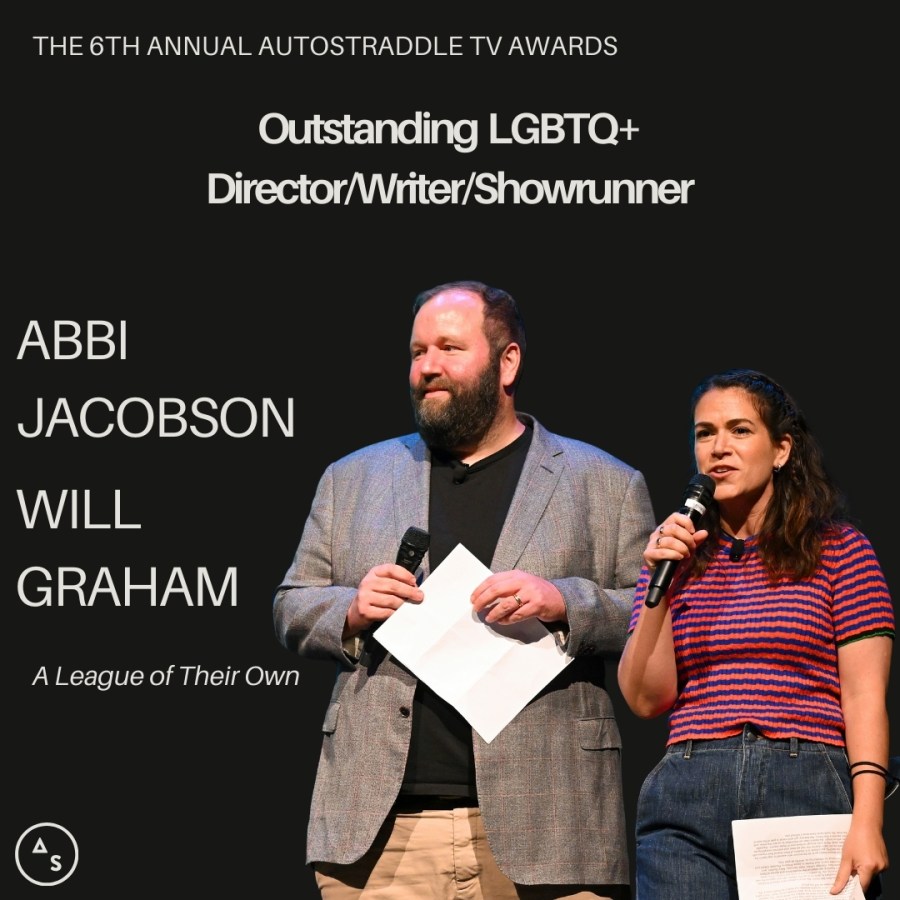
Art: Autostraddle, Original photo: Daniel Boczarski via Getty Images.
A League of Their Own was a love story. I’m not talking about Greta and Carson, or Max and Esther, or even Jess and Lupe (brothers for life) — I’m talking about the immense love poured into the series, from its very inception, by Will Graham and Abbi Jacobson.
Remounting a 30 year old property was never going to be an “easy” task. We often talk about the deluge of reboots and remakes in Hollywood, but the majority of those are adrenaline pumping, action-based IPs or comedies that long ago went stale — not quiet and emotional stories of sisterhood and sports kept alive for three decades on the backs of (it’s time to finally be honest here) largely queer fans. Those type of brands do not get revived every day.
And even still, Penny Marshall’s A League of Their Own was not a perfect film. It had gaps around race and sexuality, some of which are tied to its 1992 release. Lesser creators would have glazed over those insufficiencies. Instead, Graham and Jacobson faced them head-on.
When A League of Their Own finally aired, there were no greater champions than Abbi Jacobson pushing hard at every red carpet and Will Graham in the trenches with the fans on social. When rumors began that Prime Video was considering cancelling the series after its first time at bat, Will Graham was there once again telling fans to reach for #MoreThanFour. They loved this series. And I mean, really, truly loved it. Right to the very end.
This homage I’m paying is small, but I hope this Thank You is mighty. — Carmen
Most Groundbreaking Representation
A League of Their Own
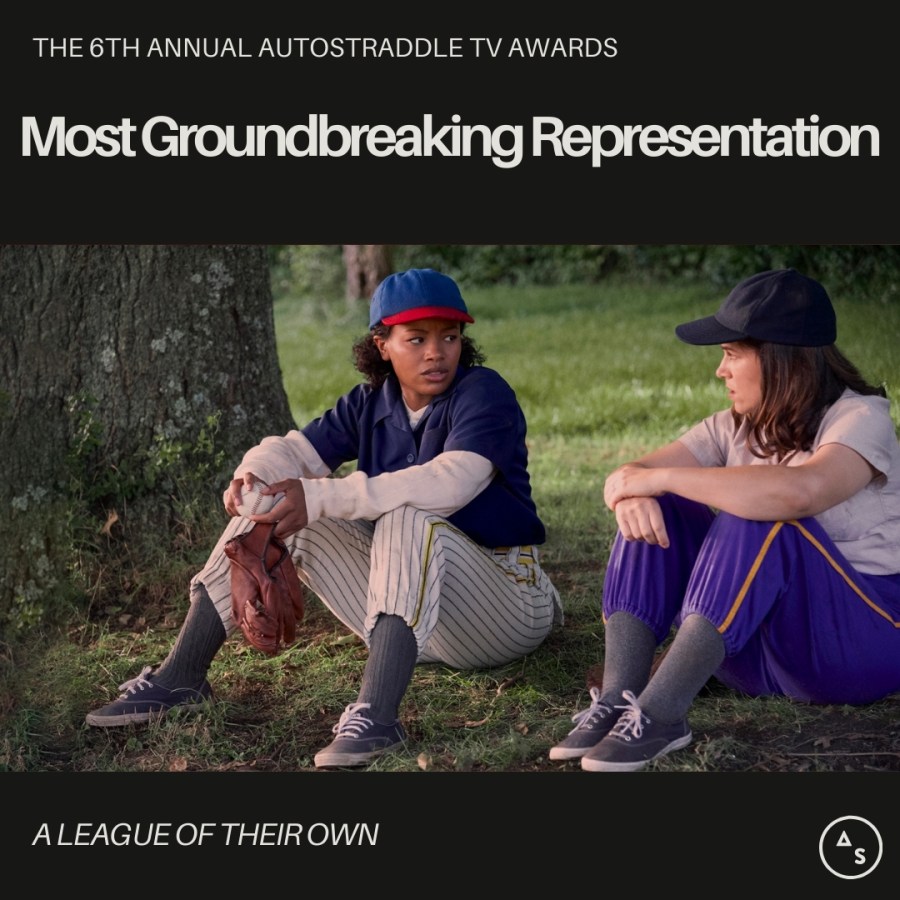
Our Community’s reaction to the mind-boggling volume of queer characters in A League Of Their Own was so intense that NBC wrote a whole article about it, in which they noted that the conversation around ALOTO “reached a fever pitch” after its debut weekend, with some calling it the greatest queer show of all time. I told NBC and I’m telling you now that in one mere season, ALOTO delivered more lead queer women characters than any other show not explicitly about queer women (e.g., The L Word, Lip Service), and it even gives those shows a run for their money. A League Of Their Own, much to the chagrin of so many haters, broke from its source material by daring to portray the league as it really was: full of lesbians, even though it was indeed the 1940s.
From players exploring the rich underground gay bar culture of the era to the queer Black community Max discovers through her Uncle Bertie to the casual butch fashion sported by Lupe and Jess; A League of Their Own broke ground by daring to say that yes, most of the girls on that field were gay as fuck. — Riese
Outstanding Hairstyling for an LGBTQ+ Character
Max Chapman (played by Chanté Adams, styled by Mary Ann Valdes), A League of Their Own
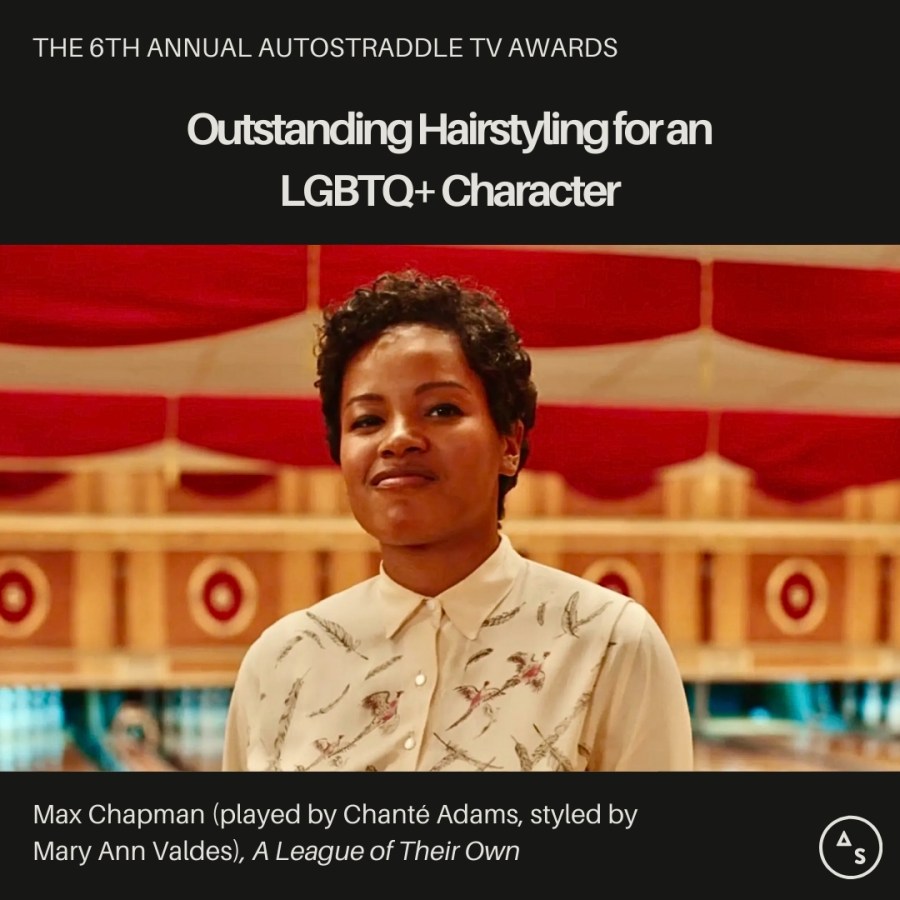
It’s rare for me to quote… well, myself. Especially during an awards moment like this. But there really is no other way that I can think to talk about this moment:
“Max sits in Bertie and Gracie’s warm yellow kitchen on a stool. Three Black queer people, across two generations, creating a new family other their own, rooted in our oldest traditions. The kitchen hair salon goes back as far as Black folks. It’s on purpose that it’s here. Bertie asks if Max is sure about this.
Max inhales and licks her bottom lip before letting her teeth graze across it. Miss Toni said that Max’s hair was one of the things she liked most about her, so yes, this is the first step to Max figuring out who she is on her own. She’s sure.”
It was in Max’s queer haircut that she first got to be in her own skin, on her own terms. It was in Bert’s kitchen that Max finally gave way from what she once was in order to become who she’ll grow into. I think that when we think of Max, when we think of that haircut, those are all the things we think of first. But I’d like to point out something different.
When Bertie cuts Max’s hair, they begin humming. Max — who until that point has had her shoulders tensed up near her ears — finally takes a stuttered, but deep breath. Her mom used to hum that song. Bert smiles “Well, maybe you came here to find a piece of home.” — Carmen
Outstanding Costume Design for a Show With LGBTQ+ Characters
A League of Their Own (costume design: Nancy Steiner, Trayce Gigi Fields)
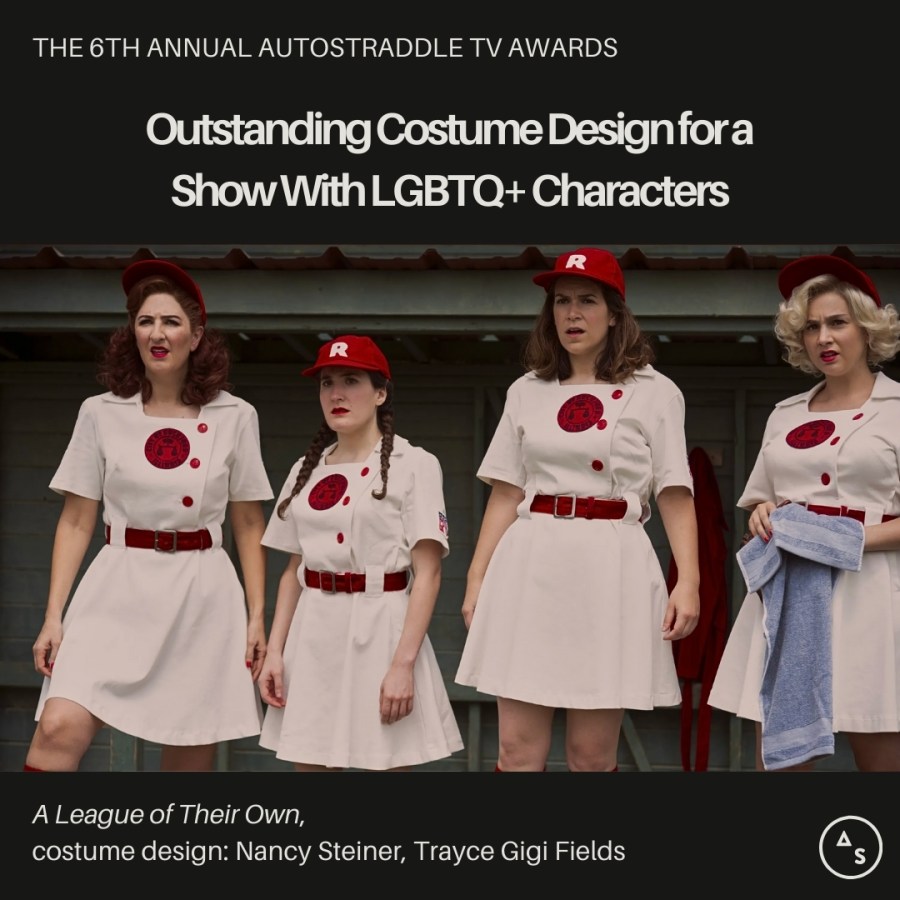
Costume designer Trayce Gigi Field’s resume is stacked with sharpy stylized shows and movies like Poker Face, The After Party, Barb & Star Go To Vista Del Mar and Now Apocalypse. Her work on A League of Their Own was remarkable; nailing the specifics of the period and the confines of wartime clothing regulation while also dressing characters who regularly morphed in and out of properly “gendered” apparel depending on context. From factory boilersuits to Max’s self-reflection around wearing her first tailored suit to high femme jock Greta’s elevated house dresses to Jess’s scrappy workwear, Field hit it out of the park every time.
As reported by Fashionista, Field did loads of research on the era to nail every character’s socio-economic statuses and backgrounds, mixing custom pieces with sourced 1940s vintagewear. Even the classic Peaches uniform (and that of their competitors) got a light refresh, one echoed by everybody ever for Halloween 2022. (For a special treat, check out Trayce’s online portfolio from the series, which features behind-the-scenes photos and also her full-color sketches for each baseball team’s unique look and some of the lead character’s most memorable costumes.) — Riese
Fan Favorite Categories
Fan Favorite Couple: Maya and Carina, Station 19
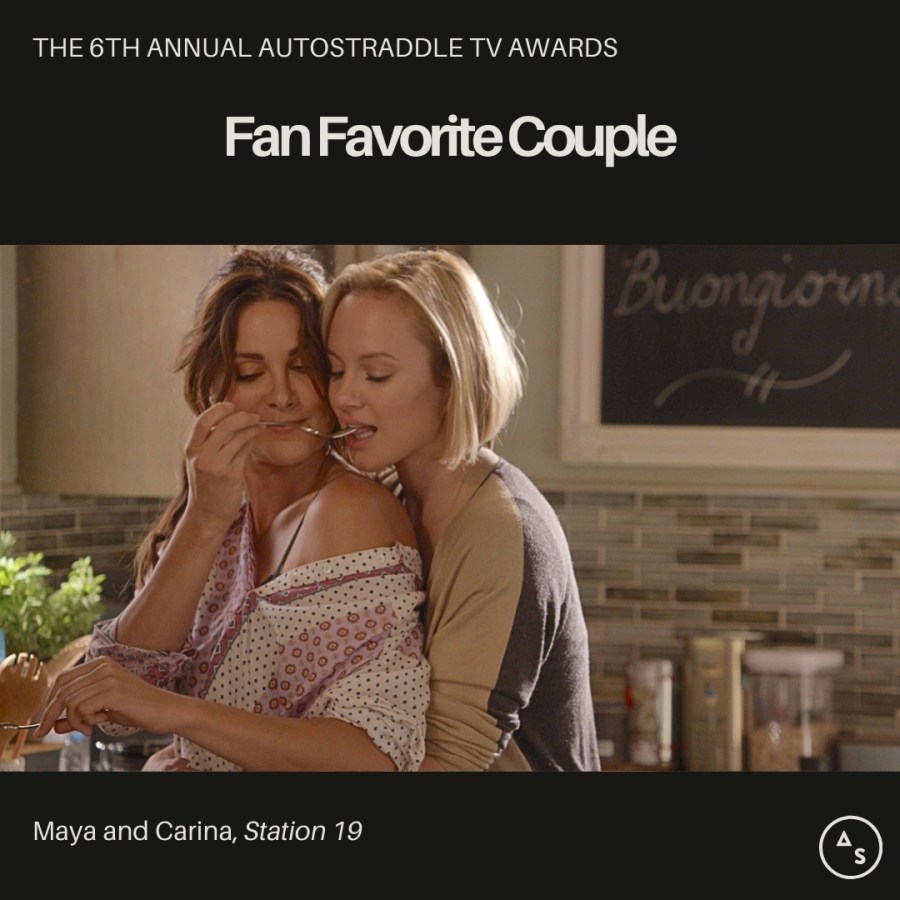
Fan Favorite Character: Sister Beatrice, Warrior Nun
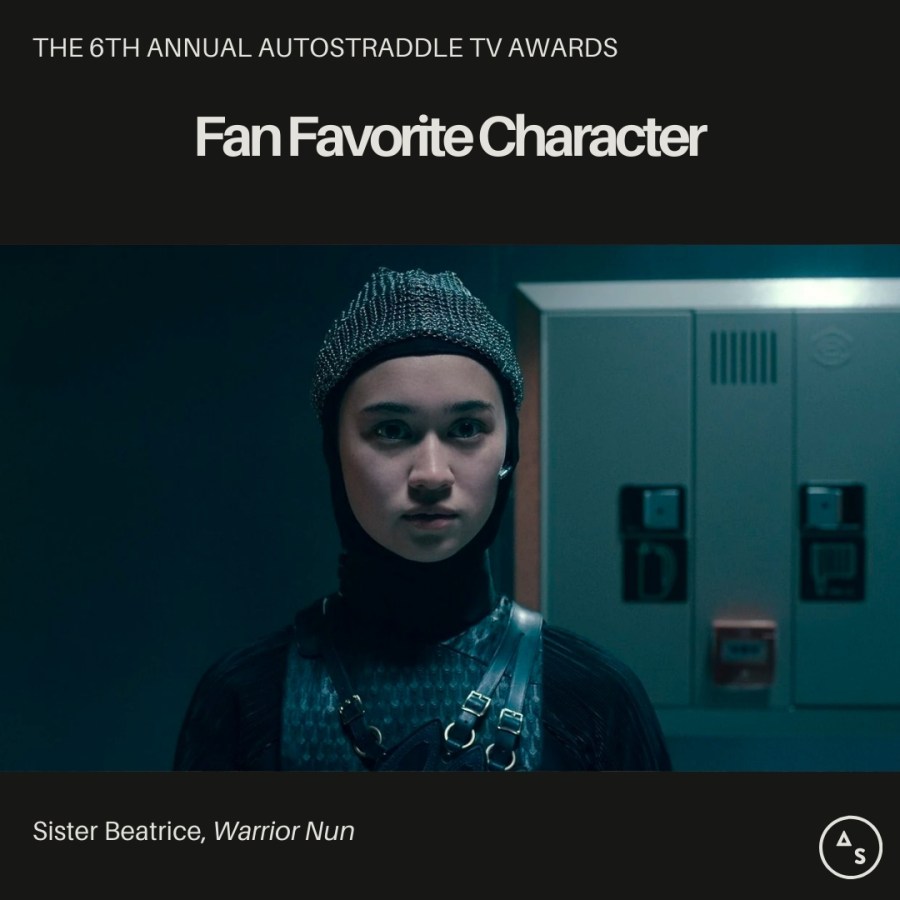
Fan Favorite Out Actor: Bella Ramsey, The Last of Us
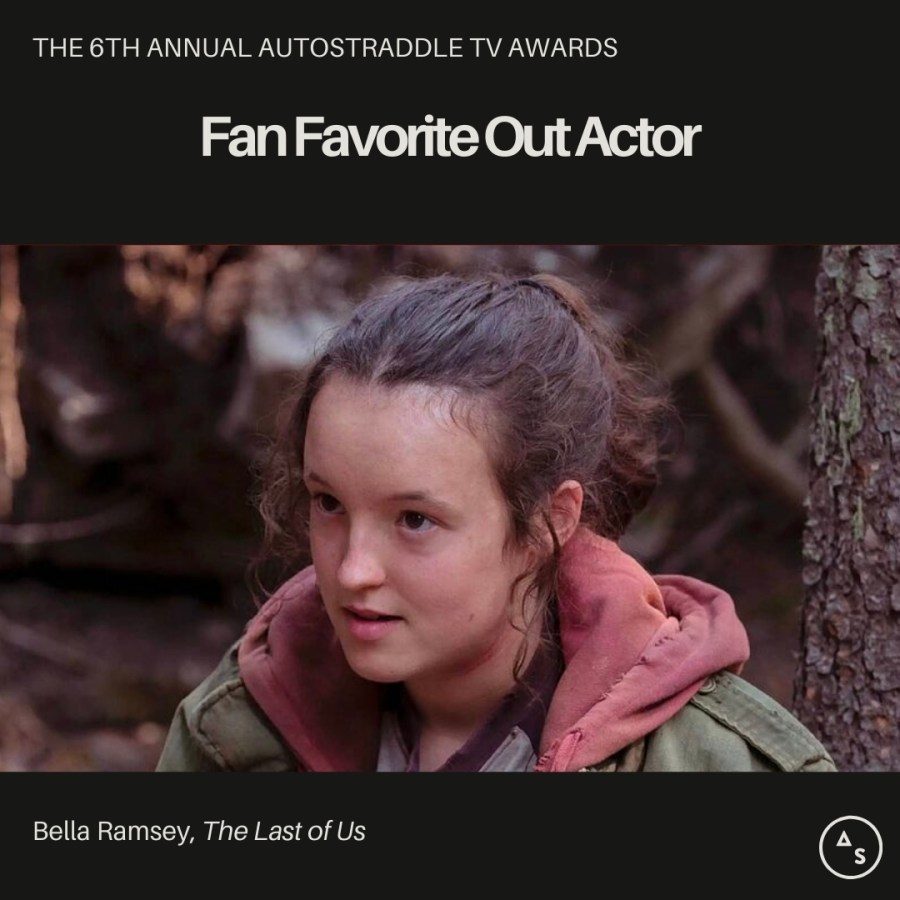


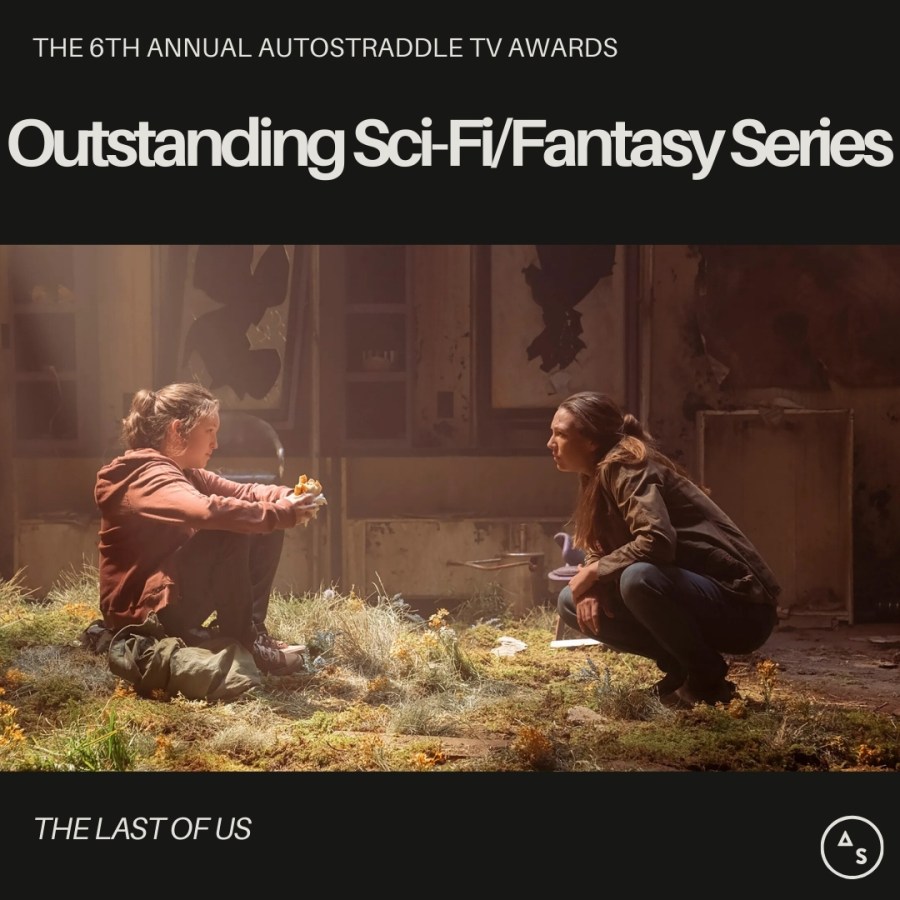

❤❤❤
Yes Lea Robinson!!!
I commented on the original article that Melanie Lynskey isn’t straight, gave you a link where she clearly implied she was bisexual saying she’s attracted like 70% of the time to men and 30% to women and yet you included her still! Disappointing
Melanie Lynskey isn’t straight (confirmed by Melanie in 23) and Shauna isn’t straight (confirmed by Sophie Nelisse in 2023) come on autostraddle
I know AS has pretty much given up on covering actual queer women content, but the straight up (ha) queer erasure of Melanie Lynskey and Shauna’s character is just pathetic.
So proud of you Ari Notartomaso!